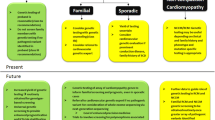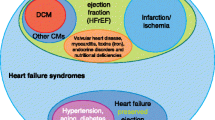Abstract
Purpose of Review
The purpose of this review is to provide an update on the recent advances in the genetics and genomics of dilated cardiomyopathy and heart failure.
Recent Findings
Over the last decade, the approach to the discovery of the genetic contribution to heart failure has evolved from investigation of rare variants implicated in Mendelian cardiomyopathies through linkage studies and candidate gene studies to the exploration of the contribution of common variants through large-scale genome-wide association and genome-first studies.
Summary
The combination and integration of multiple of case-control heart failure cohorts, refinement of the heart failure phenotype, and utilization of large biobanks linked to electronic health records have advanced the understanding of the heritability of heart failure.

Similar content being viewed by others
References
Papers of particular interest, published recently, have been highlighted as: • Of importance •• Of major importance
Benjamin EJ, Muntner P, Alonso A, Bittencourt MS, Callaway CW, Carson AP, et al. Heart disease and stroke statistics-2019 update: a report from the American Heart Association. Circulation. 2019;139:e56–528. https://doi.org/10.1161/CIR.0000000000000659.
Ziaeian B, Fonarow GC. Epidemiology and aetiology of heart failure. Nat Rev Cardiol. 2016;13:368–78. https://doi.org/10.1038/nrcardio.2016.25.
Glynn P, Lloyd-Jones DM, Feinstein MJ, Carnethon M, Khan SS. Disparities in cardiovascular mortality related to heart failure in the United States. J Am Coll Cardiol. 2019;73:2354–5. https://doi.org/10.1016/j.jacc.2019.02.042.
Roger VL, Weston SA, Redfield MM, Hellermann-Homan JP, Killian J, Yawn BP, et al. Trends in heart failure incidence and survival in a community-based population. JAMA. 2004;292:344–50. https://doi.org/10.1001/jama.292.3.344.
Jarcho JA, McKenna W, Pare JA, Solomon SD, Holcombe RF, Dickie S, et al. Mapping a gene for familial hypertrophic cardiomyopathy to chromosome 14q1. N Engl J Med. 1989;321:1372–8. https://doi.org/10.1056/NEJM198911163212005.
Watkins H, Rosenzweig A, Hwang DS, Levi T, McKenna W, Seidman CE, et al. Characteristics and prognostic implications of myosin missense mutations in familial hypertrophic cardiomyopathy. N Engl J Med. 1992;326:1108–14. https://doi.org/10.1056/NEJM199204233261703.
Reza N, Musunuru K, Owens AT. From hypertrophy to heart failure: what is new in genetic cardiomyopathies. Curr Heart Fail Rep. 2019;16:157–67. https://doi.org/10.1007/s11897-019-00435-0.
Lee DS, Pencina MJ, Benjamin EJ, Wang TJ, Levy D, O’Donnell CJ, et al. Association of parental heart failure with risk of heart failure in offspring. N Engl J Med. 2006;355:138–47. https://doi.org/10.1056/NEJMoa052948.
Mahmood SS, Wang TJ. The epidemiology of congestive heart failure: the Framingham heart study perspective. Glob Heart. 2013;8:77–82. https://doi.org/10.1016/j.gheart.2012.12.006.
McKee PA, Castelli WP, McNamara PM, Kannel WB. The natural history of congestive heart failure: the Framingham study. N Engl J Med. 1971;285:1441–6. https://doi.org/10.1056/NEJM197112232852601.
Yancy CW, Jessup M, Bozkurt B, Butler J, Casey DE, Drazner MH, et al. 2013 ACCF/AHA guideline for the management of heart failure: a report of the American College of Cardiology Foundation/American Heart Association Task Force on Practice Guidelines. J Am Coll Cardiol. 2013;62:e147–239. https://doi.org/10.1016/j.jacc.2013.05.019.
Maron BJ, Towbin JA, Thiene G, Antzelevitch C, Corrado D, Arnett D, et al. Contemporary definitions and classification of the cardiomyopathies: an American Heart Association Scientific Statement from the Council on Clinical Cardiology, Heart Failure and Transplantation Committee; Quality of Care and Outcomes Research and Functional Genomics and Translational Biology Interdisciplinary Working Groups; and Council on Epidemiology and Prevention. Circulation. 2006;113:1807–16. https://doi.org/10.1161/CIRCULATIONAHA.106.174287.
Kinnamon DD, Morales A, Bowen DJ, Burke W, Hershberger RE, DCM Consortium*. Toward genetics-driven early intervention in dilated cardiomyopathy: design and implementation of the DCM precision medicine study. Circ Cardiovasc Genet. 2017;10:10. https://doi.org/10.1161/CIRCGENETICS.117.001826.
Cappola TP, Li M, He J, Ky B, Gilmore J, Qu L, et al. Common variants in HSPB7 and FRMD4B associated with advanced heart failure. Circ Cardiovasc Genet. 2010;3:147–54. https://doi.org/10.1161/CIRCGENETICS.109.898395.
Smith NL, Felix JF, Morrison AC, Demissie S, Glazer NL, Loehr LR, et al. Association of genome-wide variation with the risk of incident heart failure in adults of European and African ancestry: a prospective meta-analysis from the cohorts for heart and aging research in genomic epidemiology (CHARGE) consortium. Circ Cardiovasc Genet. 2010;3:256–66. https://doi.org/10.1161/CIRCGENETICS.109.895763.
Morrison AC, Felix JF, Cupples LA, Glazer NL, Loehr LR, Dehghan A, et al. Genomic variation associated with mortality among adults of European and African ancestry with heart failure: the cohorts for heart and aging research in genomic epidemiology consortium. Circ Cardiovasc Genet. 2010;3:248–55. https://doi.org/10.1161/CIRCGENETICS.109.895995.
Stark K, Esslinger UB, Reinhard W, Petrov G, Winkler T, Komajda M, et al. Genetic association study identifies HSPB7 as a risk gene for idiopathic dilated cardiomyopathy. PLoS Genet. 2010;6:e1001167. https://doi.org/10.1371/journal.pgen.1001167.
Villard E, Perret C, Gary F, Proust C, Dilanian G, Hengstenberg C, et al. A genome-wide association study identifies two loci associated with heart failure due to dilated cardiomyopathy. Eur Heart J. 2011;32:1065–76. https://doi.org/10.1093/eurheartj/ehr105.
Horne BD, Rasmusson KD, Alharethi R, Budge D, Brunisholz KD, Metz T, et al. Genome-wide significance and replication of the chromosome 12p11.22 locus near the PTHLH gene for peripartum cardiomyopathy. Circ Cardiovasc Genet. 2011;4:359–66. https://doi.org/10.1161/CIRCGENETICS.110.959205.
Fox ER, Musani SK, Barbalic M, Lin H, Yu B, Ogunyankin KO, et al. Genome-wide association study of cardiac structure and systolic function in African Americans: the Candidate Gene Association Resource (CARe) study. Circ Cardiovasc Genet. 2013;6:37–46. https://doi.org/10.1161/CIRCGENETICS.111.962365.
Meder B, Rühle F, Weis T, Homuth G, Keller A, Franke J, et al. A genome-wide association study identifies 6p21 as novel risk locus for dilated cardiomyopathy. Eur Heart J. 2014;35:1069–77. https://doi.org/10.1093/eurheartj/eht251.
Smith JG, Felix JF, Morrison AC, Kalogeropoulos A, Trompet S, Wilk JB, et al. Discovery of genetic variation on chromosome 5q22 associated with mortality in heart failure. PLoS Genet. 2016;12:e1006034. https://doi.org/10.1371/journal.pgen.1006034.
Aragam KG, Chaffin M, Levinson RT, McDermott G, Choi S-H, Shoemaker MB, et al. Phenotypic refinement of heart failure in a national biobank facilitates genetic discovery. Circulation. 2018;139:489–501. https://doi.org/10.1161/CIRCULATIONAHA.118.035774.
• Shah S, Henry A, Roselli C, Lin H, Sveinbjörnsson G, Fatemifar G, et al. Genome-wide association and Mendelian randomisation analysis provide insights into the pathogenesis of heart failure. Nat Commun. 2020;11:163. https://doi.org/10.1038/s41467-019-13690-5This study reports findings from the largest heart failure genome-wide association study to date.
•• Bycroft C, Freeman C, Petkova D, Band G, Elliott LT, Sharp K, et al. The UK Biobank resource with deep phenotyping and genomic data. Nature. 2018;562:203–9. https://doi.org/10.1038/s41586-018-0579-zThis manuscript summarizes the existing and planned content of the UK Biobank.
Abul-Husn NS, Kenny EE. Personalized medicine and the power of electronic health records. Cell. 2019;177:58–69. https://doi.org/10.1016/j.cell.2019.02.039.
Herman DS, Lam L, Taylor MRG, Wang L, Teekakirikul P, Christodoulou D, et al. Truncations of titin causing dilated cardiomyopathy. N Engl J Med. 2012;366:619–28. https://doi.org/10.1056/NEJMoa1110186.
Akinrinade O, Alastalo T-P, Koskenvuo JW. Relevance of truncating titin mutations in dilated cardiomyopathy. Clin Genet. 2016;90:49–54. https://doi.org/10.1111/cge.12741.
Haas J, Frese KS, Peil B, Kloos W, Keller A, Nietsch R, et al. Atlas of the clinical genetics of human dilated cardiomyopathy. Eur Heart J. 2015;36:1123–35. https://doi.org/10.1093/eurheartj/ehu301.
Ware JS, Li J, Mazaika E, Yasso CM, DeSouza T, Cappola TP, et al. Shared genetic predisposition in peripartum and dilated cardiomyopathies. N Engl J Med. 2016;374:233–41. https://doi.org/10.1056/NEJMoa1505517.
Ware JS, Amor-Salamanca A, Tayal U, Govind R, Serrano I, Salazar-Mendiguchía J, et al. Genetic etiology for alcohol-induced cardiac toxicity. J Am Coll Cardiol. 2018;71:2293–302. https://doi.org/10.1016/j.jacc.2018.03.462.
Garcia-Pavia P, Kim Y, Restrepo-Cordoba MA, Lunde IG, Wakimoto H, Smith AM, et al. Genetic variants associated with cancer therapy-induced cardiomyopathy. Circulation. 2019;140:31–41. https://doi.org/10.1161/CIRCULATIONAHA.118.037934.
Haggerty CM, Damrauer SM, Levin MG, Birtwell D, Carey DJ, Golden AM, et al. Genomics-first evaluation of heart disease associated with Titin-truncating variants. Circulation. 2019;140:42–54. https://doi.org/10.1161/CIRCULATIONAHA.119.039573.
Pirruccello JP, Bick A, Chaffin M, Aragam KG, Choi SH, Lubitz SA, et al. Titin truncating variants in adults without known congestive heart failure. J Am Coll Cardiol. 2020;75:1239–41. https://doi.org/10.1016/j.jacc.2020.01.013.
Pirruccello JP, Bick A, Wang M, Chaffin M, Friedman S, Yao J, et al. Analysis of cardiac magnetic resonance imaging in 36,000 individuals yields genetic insights into dilated cardiomyopathy. Nat Commun. 2020;11:2254. https://doi.org/10.1038/s41467-020-15823-7.
Park J, Levin MG, Haggerty CM, Hartzel DN, Judy R, Kember RL, et al. A genome-first approach to aggregating rare genetic variants in LMNA for association with electronic health record phenotypes. Genet Med Off J Am Coll Med Genet. 2020;22:102–11. https://doi.org/10.1038/s41436-019-0625-8.
Oni-Orisan A, Lanfear DE. Pharmacogenomics in heart failure: where are we now and how can we reach clinical application? Cardiol Rev. 2014;22:193–8. https://doi.org/10.1097/CRD.0000000000000028.
Cresci S, Pereira NL, Ahmad F, Byku M, de Las FL, Lanfear DE, et al. Heart failure in the era of precision medicine: a scientific statement from the American Heart Association. Circ Genomic Precis Med. 2019;12:458–85. https://doi.org/10.1161/HCG.0000000000000058.
O’Connor CM, Fiuzat M, Carson PE, Anand IS, Plehn JF, Gottlieb SS, et al. Combinatorial pharmacogenetic interactions of bucindolol and β1, α2C adrenergic receptor polymorphisms. PLoS One. 2012;7:e44324. https://doi.org/10.1371/journal.pone.0044324.
Aleong RG, Sauer WH, Robertson AD, Liggett SB, Bristow MR. Adrenergic receptor polymorphisms and prevention of ventricular arrhythmias with bucindolol in patients with chronic heart failure. Circ Arrhythm Electrophysiol. 2013;6:137–43. https://doi.org/10.1161/CIRCEP.111.969618.
Kao DP, Davis G, Aleong R, O’Connor CM, Fiuzat M, Carson PE, et al. Effect of bucindolol on heart failure outcomes and heart rate response in patients with reduced ejection fraction heart failure and atrial fibrillation. Eur J Heart Fail. 2013;15:324–33. https://doi.org/10.1093/eurjhf/hfs181.
Rau T, Düngen H-D, Edelmann F, Waagstein F, Lainščak M, Dimković S, et al. Impact of the β1-adrenoceptor Arg389Gly polymorphism on heart-rate responses to bisoprolol and carvedilol in heart-failure patients. Clin Pharmacol Ther. 2012;92:21–8. https://doi.org/10.1038/clpt.2012.18.
Fiuzat M, Neely ML, Starr AZ, Kraus WE, Felker GM, Donahue M, et al. Association between adrenergic receptor genotypes and beta-blocker dose in heart failure patients: analysis from the HF-ACTION DNA substudy. Eur J Heart Fail. 2013;15:258–66. https://doi.org/10.1093/eurjhf/hfs175.
Cuoco MAR, Pereira AC, de FA da Mota G, Krieger JE, Mansur AJ. Genetic polymorphism, medical therapy and sequential cardiac function in patients with heart failure. Arq Bras Cardiol. 2008;90:252–6.
Kohno M, Yokokawa K, Minami M, Kano H, Yasunari K, Hanehira T, et al. Association between angiotensin-converting enzyme gene polymorphisms and regression of left ventricular hypertrophy in patients treated with angiotensin-converting enzyme inhibitors. Am J Med. 1999;106:544–9. https://doi.org/10.1016/s0002-9343(99)00067-4.
Wu C-K, Luo J-L, Tsai C-T, Huang Y-T, Cheng C-L, Lee J-K, et al. Demonstrating the pharmacogenetic effects of angiotensin-converting enzyme inhibitors on long-term prognosis of diastolic heart failure. Pharmacogenomics J. 2010;10:46–53. https://doi.org/10.1038/tpj.2009.39.
McNamara DM, Holubkov R, Postava L, Janosko K, MacGowan GA, Mathier M, et al. Pharmacogenetic interactions between angiotensin-converting enzyme inhibitor therapy and the angiotensin-converting enzyme deletion polymorphism in patients with congestive heart failure. J Am Coll Cardiol. 2004;44:2019–26. https://doi.org/10.1016/j.jacc.2004.08.048.
Aarnoudse A-JLHJ, Dieleman JP, Visser LE, Arp PP, van der Heiden IP, van Schaik RHN, et al. Common ATP-binding cassette B1 variants are associated with increased digoxin serum concentration. Pharmacogenet Genomics. 2008;18:299–305. https://doi.org/10.1097/FPC.0b013e3282f70458.
Vormfelde SV, Brockmöller J. The genetics of loop diuretic effects. Pharmacogenomics J. 2012;12:45–53. https://doi.org/10.1038/tpj.2010.68.
Acknowledgments
Nosheen Reza reports grants from the National Institutes of Health. She is supported by the National Center for Advancing Translational Sciences of the National Institutes of Health under award number KL2TR001879. The content is solely the responsibility of the authors and does not necessarily represent the official views of the National Institutes of Health.
Anjali Tiku Owens reports grant support from the Winkelman Family Fund.
Author information
Authors and Affiliations
Corresponding author
Ethics declarations
Conflict of Interest
Nosheen Reza declares no conflict of interest.
Anjali Tiku Owens reports personal fees from MyoKardia and Cytokinetics.
Human and Animal Rights and Informed Consent
This article does not contain any studies with human or animal subjects performed by any of the authors.
Additional information
Publisher’s Note
Springer Nature remains neutral with regard to jurisdictional claims in published maps and institutional affiliations.
This article is part of the Topical Collection on Heart Failure
Rights and permissions
About this article
Cite this article
Reza, N., Owens, A.T. Advances in the Genetics and Genomics of Heart Failure. Curr Cardiol Rep 22, 132 (2020). https://doi.org/10.1007/s11886-020-01385-z
Published:
DOI: https://doi.org/10.1007/s11886-020-01385-z




